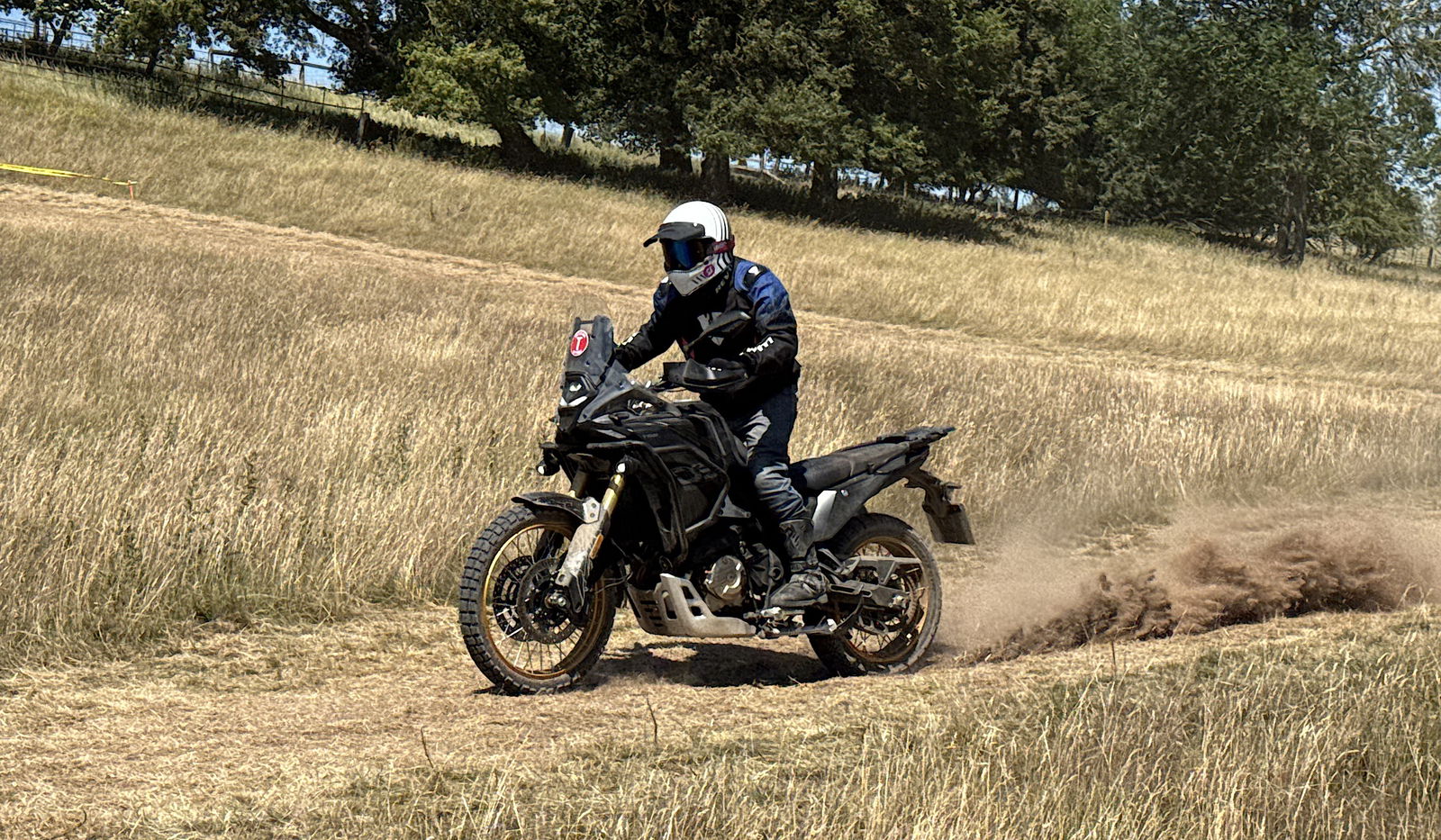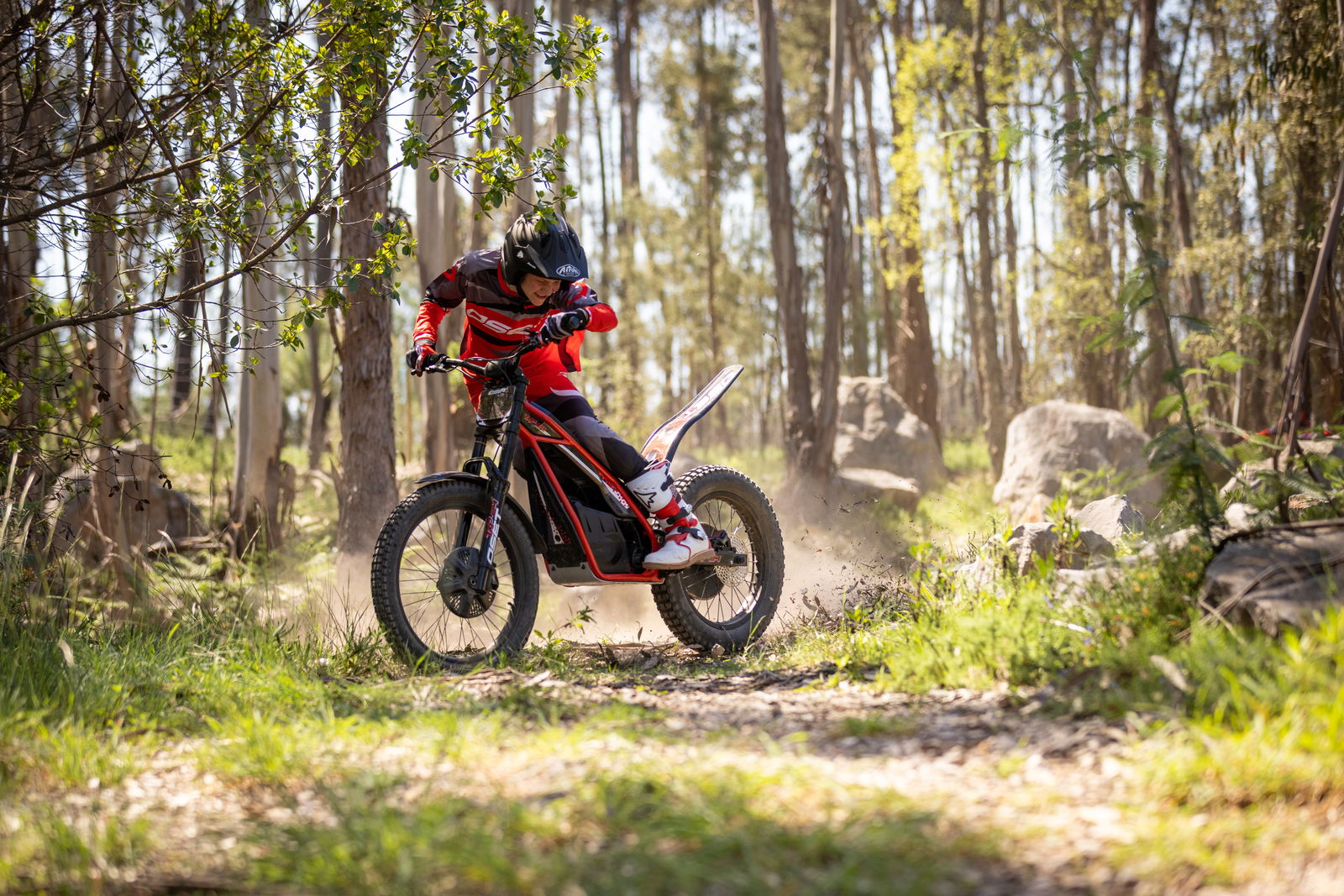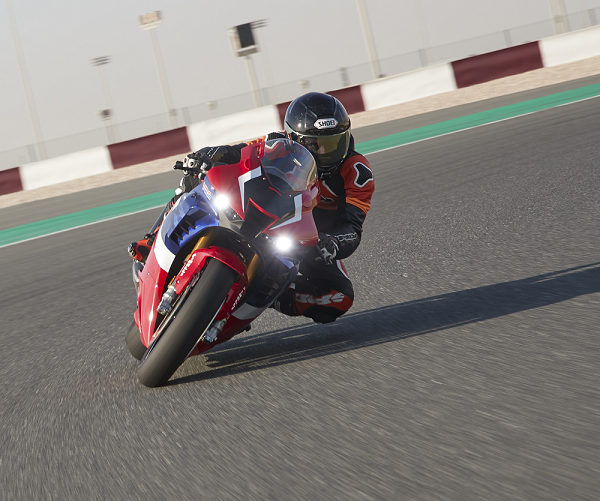GSX-8T review: Do Suzuki’s Timeless Titans make the grade
Suzuki has gone back to the 70s for its latest bikes, a pair of retro nakeds called the GSX-8T and GSX-8TT - but are they worth the hype?
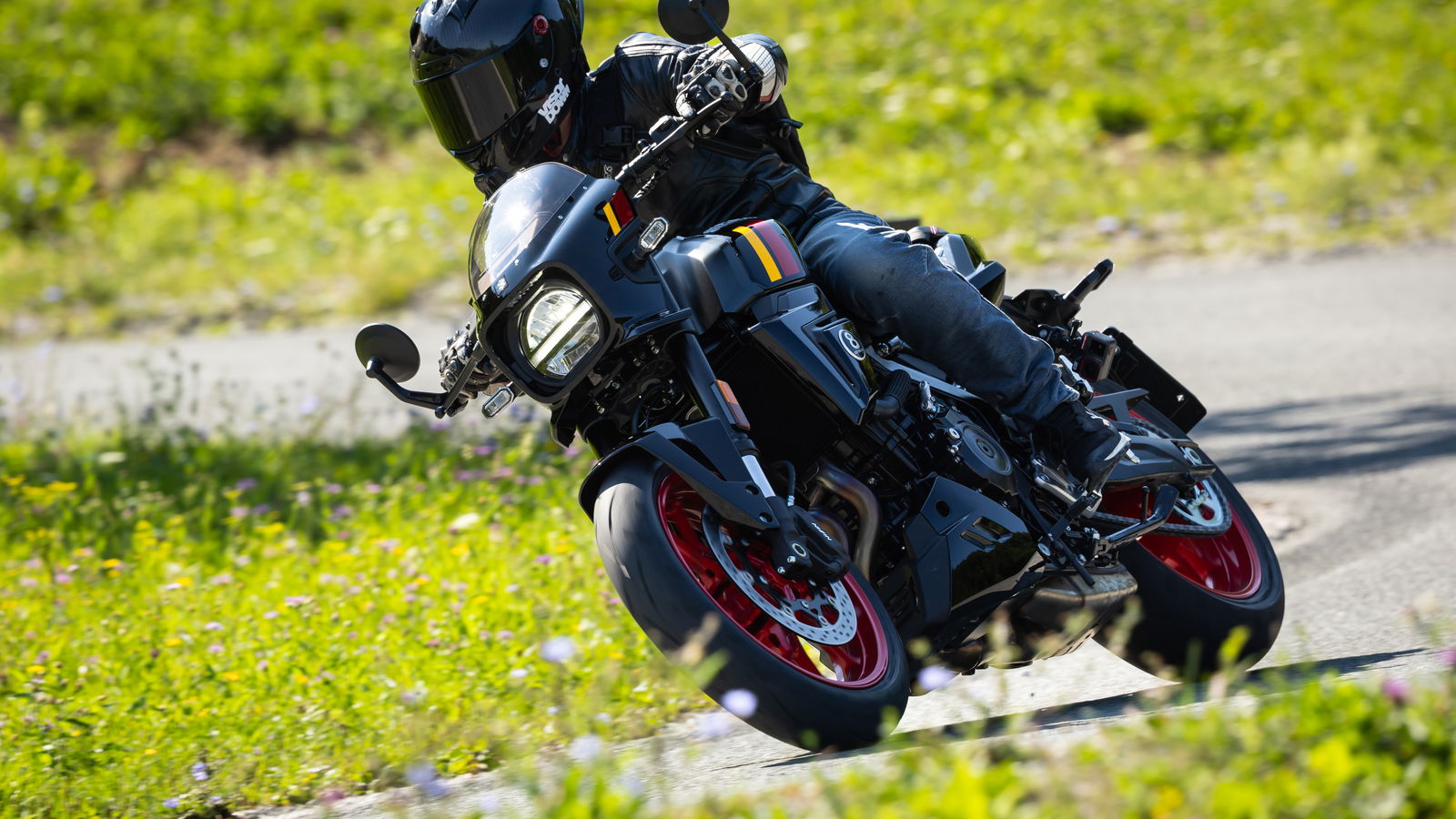
* Styling is a big improvement over the GSX-8S
* Brakes and engine are both extremely strong
* Some may question the £2,500 premium over the GSX-8S
There’s always a touch of apprehension when a manufacturer reaches back into the archives to revive a name, a model or simply a style of building a bike. But that is exactly what Suzuki has done with its new GSX-8T and GSX-8TT models - a pair of modern-classic twists on the well-received GSX-8S.
They are also an homage to the brand’s T500 two-stroke twin of the ’70s. That machine was nicknamed the Titan, so the name for these bikes, TT - meaning ‘Timeless Titans’ - feels more than a little appropriate.
A Retro Revival, Suzuki Style
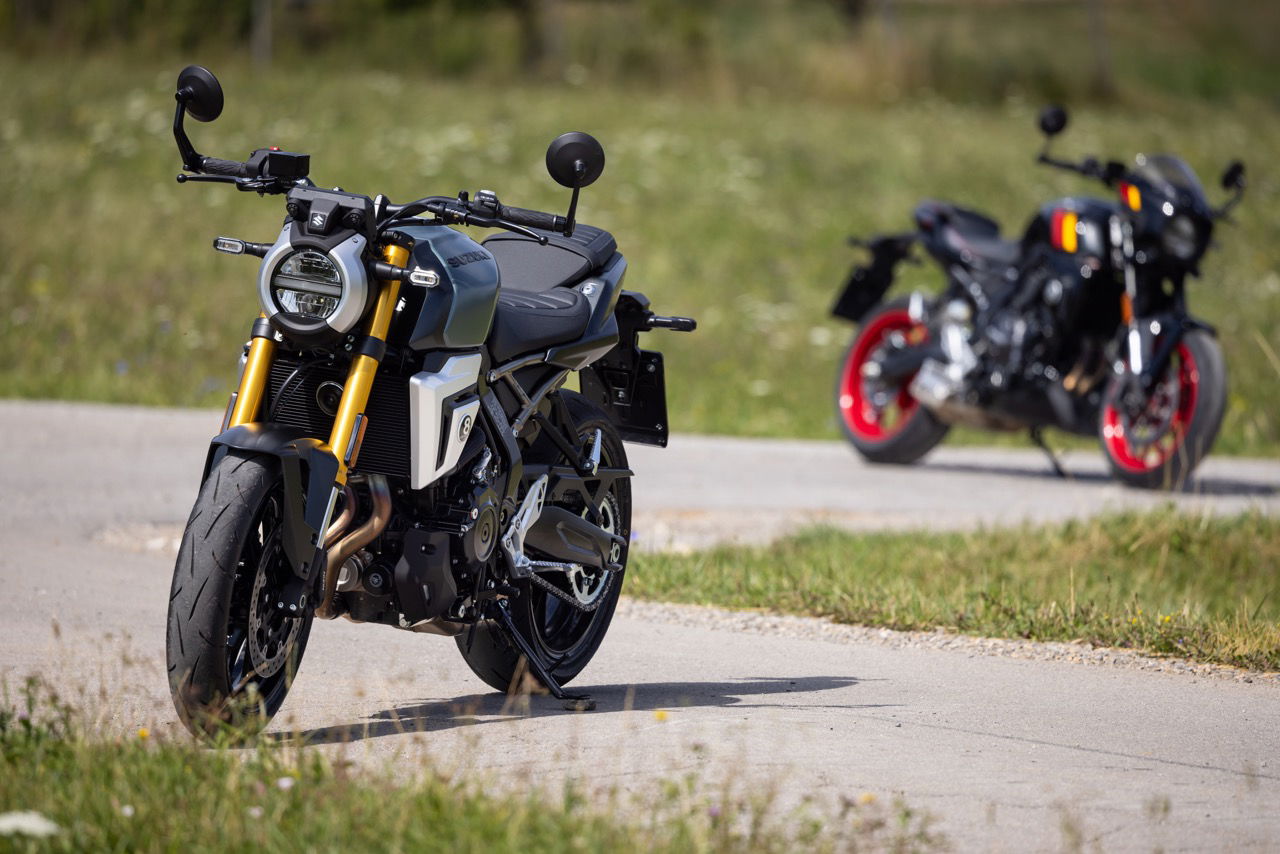
The Suzuki GSX-8T and 8TT are the kind of bikes you might not expect from Hamamatsu, modern naked machines with more than a subtle nod to the brand’s heritage. The man responsible for the styling is Arthur Vidal, a designer with a clear passion for breathing life into old names. According to Suzuki, this is something “never before seen” in the lineup, a “timeless revival” aiming to blend modern dynamics with retro aesthetics.
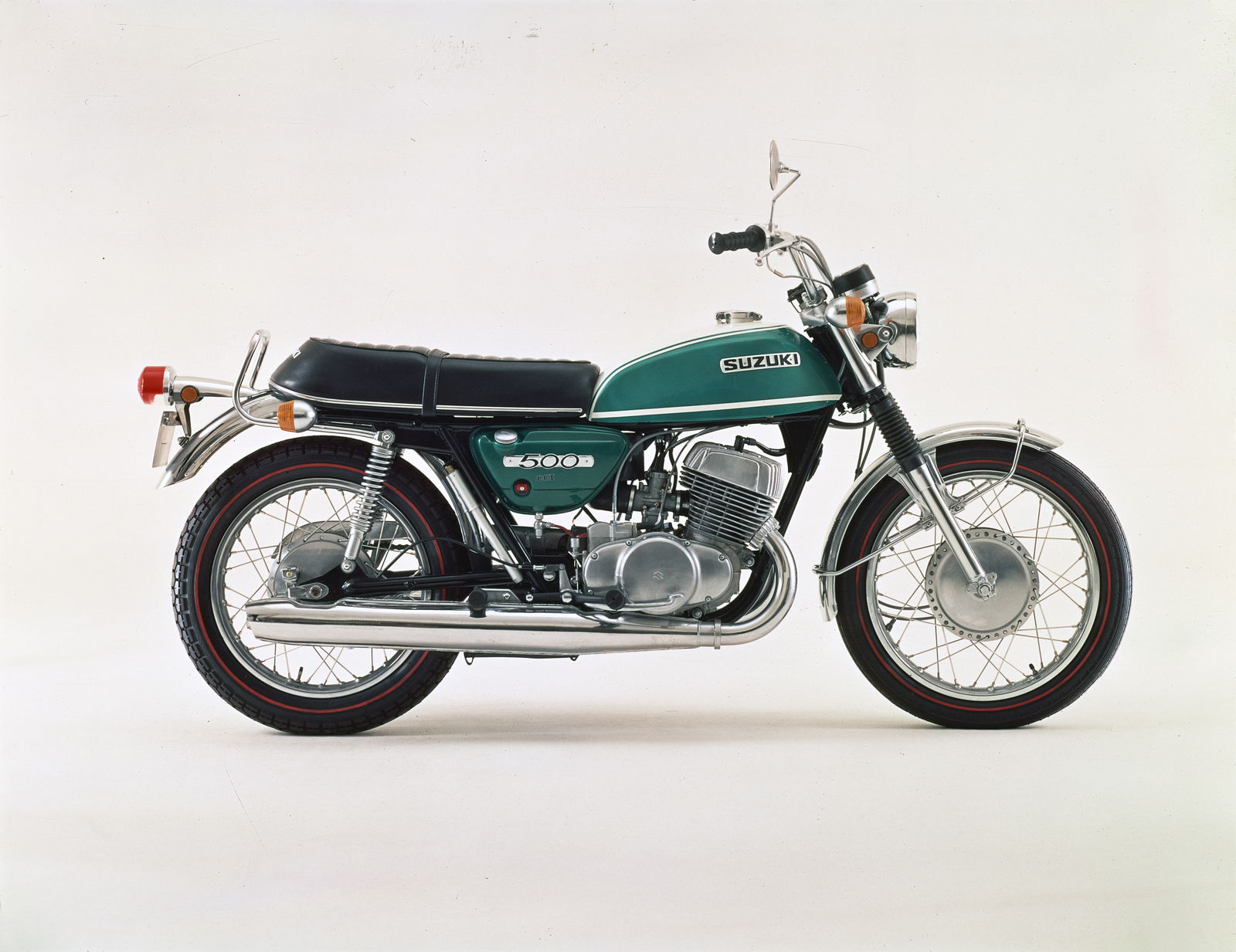
In a world increasingly obsessed with retro bikes, Suzuki has kept things grounded. No faux carburettors here or bolt-on cooling fins. What you get instead is a tasteful spin on the already capable GSX-8S platform, with clever touches and a significant nod to the T500 - without straying into cosplay territory. The new retro tank, bodywork and headlight are not there to hide the 8T and 8TT’s modern engine, but to embellish it a little.
The 8T is priced at £9,599, while the TT version will set you back £9,999. That’s a fair jump from the GSX-8S’s £7,499 sticker price, and raises an important question: is a restyle and a smattering of new parts worth £2.5K?
Time to play spot the Difference
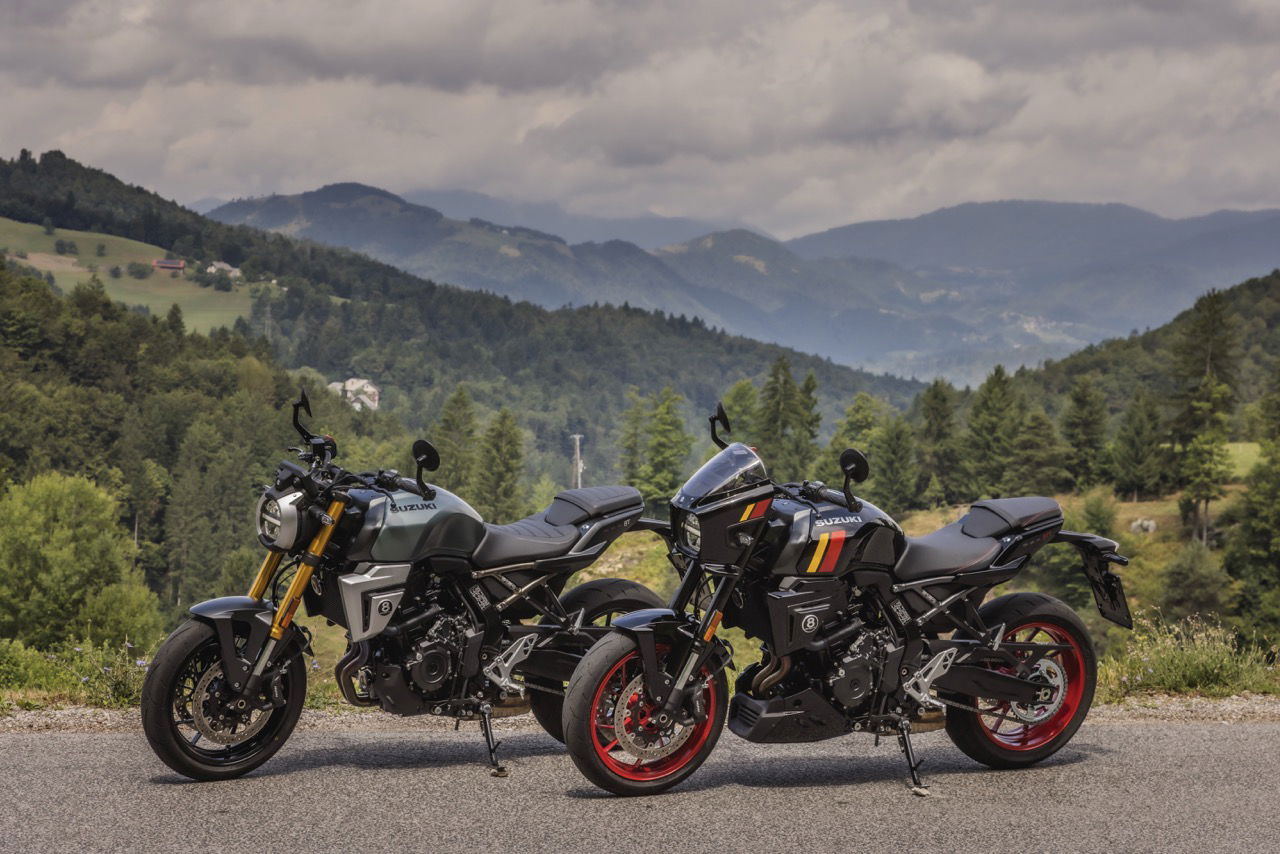
Styling-wise, the changes are numerous but subtle. A stainless muffler cover gives the exhaust a bit more visual presence, while the aluminium stem nut and bar-end mirrors (the latter of which are a first for Suzuki) add a premium touch.
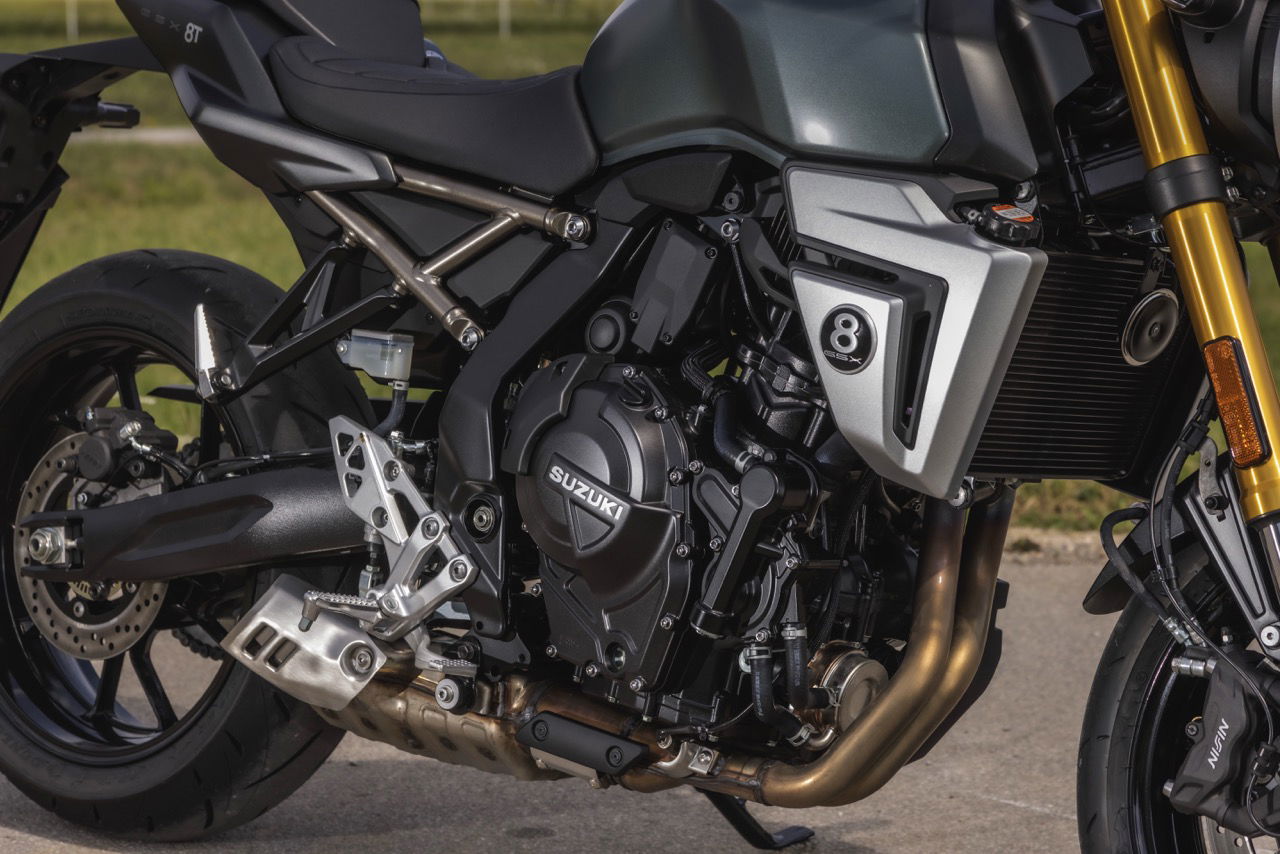
There’s a striking 8-ball motif across the bikes, linking them back to the Titan legacy, alongside an all-new Suzuki emblem on the tank, which is classier and more refined. The engine cases are now blacked out, reinforcing that classic look, while the headlight has been repositioned slightly further back, bringing weight closer to the steering head for improved handling.
On the 8T specifically, you get a ‘tuck and roll’ seat with new foam and more surface area than the 8S. It's both more visually appealing and, as we found out, a real bonus on longer rides.
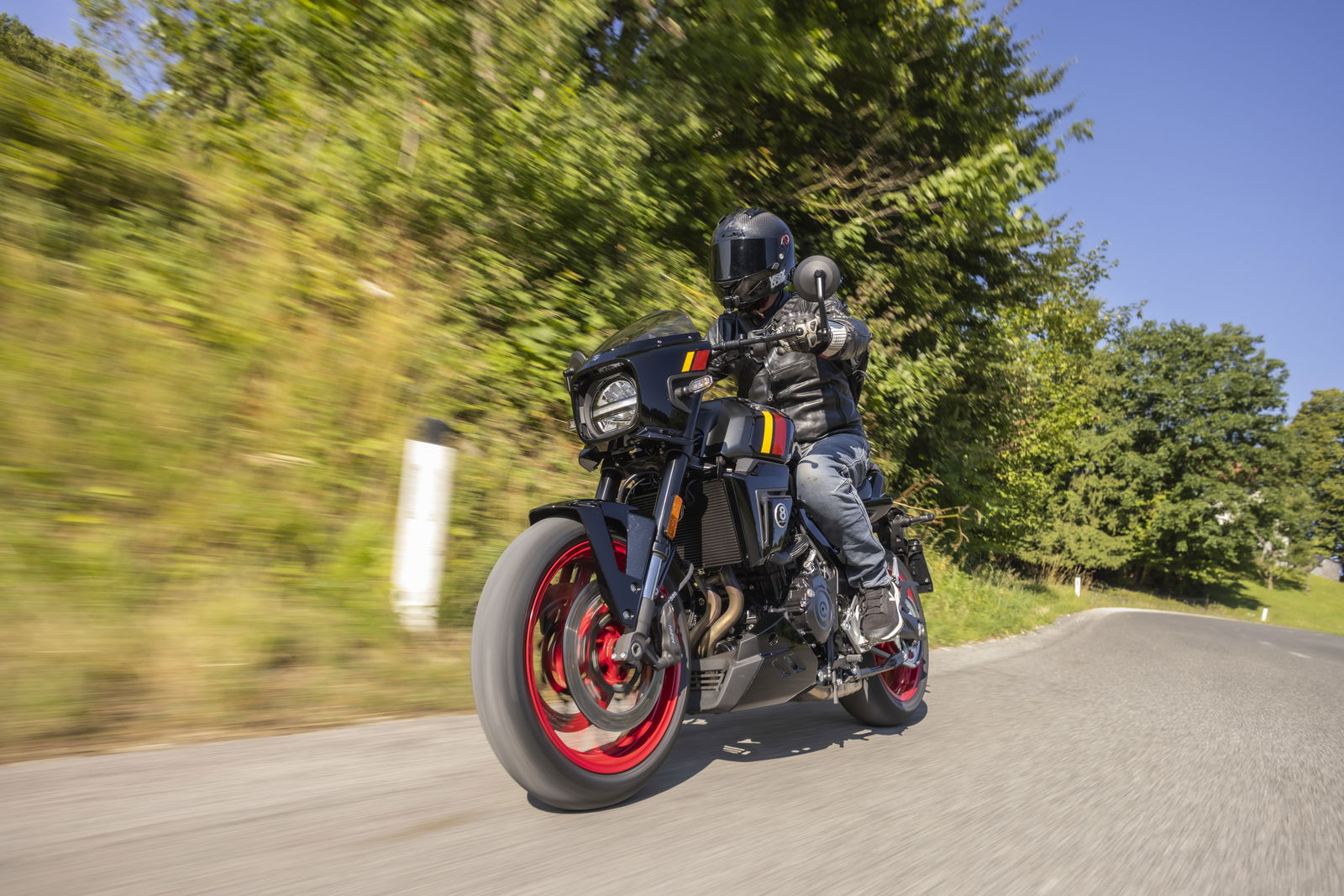
Meanwhile, the TT gains the oh-so-retro headlight cowl, which has a clever little vent tucked in above the new LED headlight. It’s a small but effective tweak, designed to channel air underneath the screen, reducing turbulence and head-buffeting at motorway speeds. It works, and we’ll come back to that later. The 8TT also gains a neat looking belly pan, which I expect you can buy for the 8T as an option.
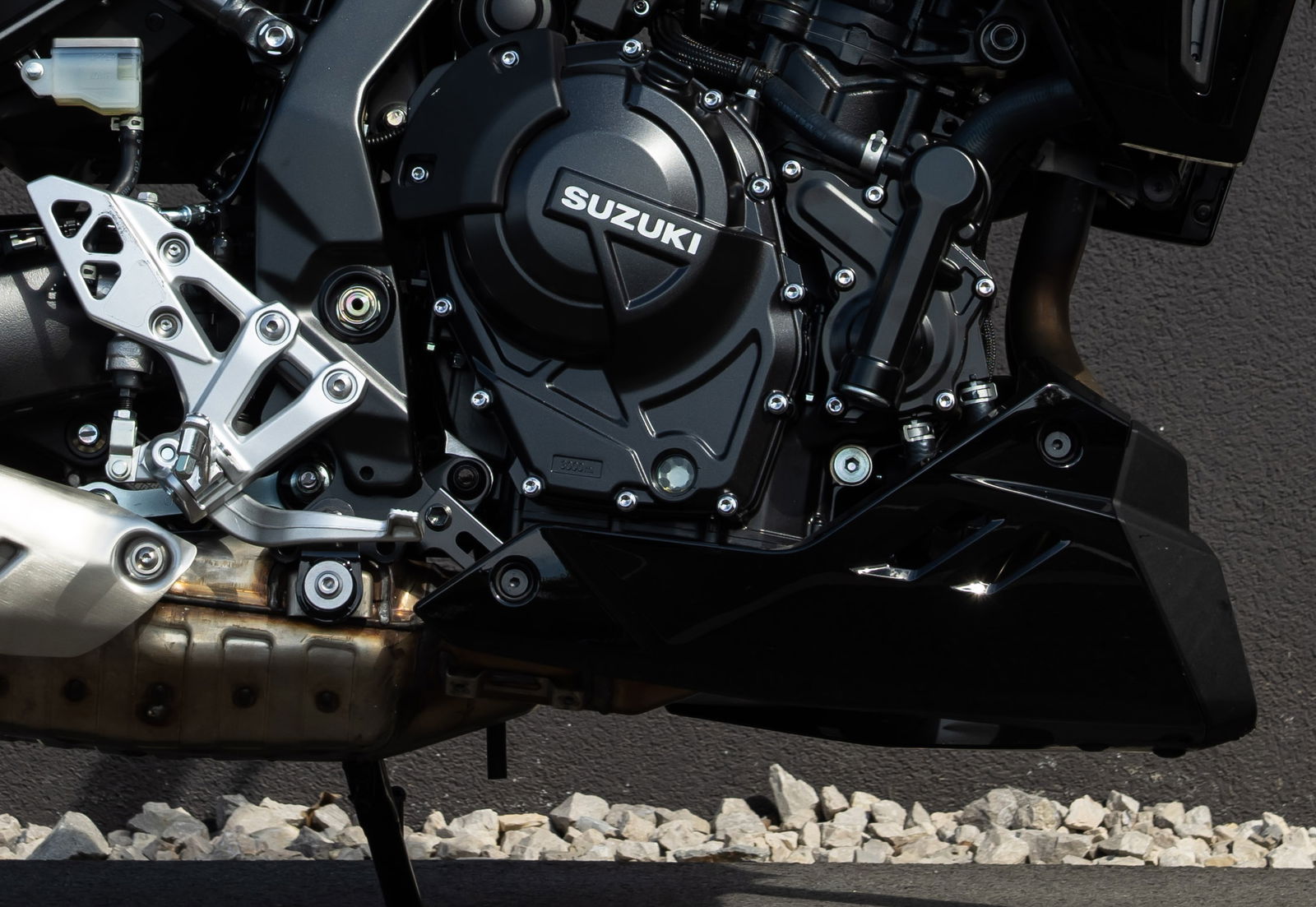
The battery is also a new lithium-ion unit, shaving around 2kg off the kerb weight and improving longevity. The new tank holds 16.5 litres (2.5 litres more than the 8S), boosting the claimed range to a respectable 244 miles. While the new tank, when brimmed, increases the kerb weight over the 8S, the lithium-ion battery sheds it, meaning the three bikes come in just a few kilograms apart.
The engine is unchanged from the 8S, which isn’t a bad thing. It’s a 798cc parallel twin pushing out 80bhp and 57lb ft of torque. Wet weight is 201kg for the 8T and 203kg for the TT. The rest of the bike’s electronics, gearbox, brakes, and suspension are all carried over from the 8S, but again, that’s no bad thing, as we’ll explain shortly.
If You’ve Ridden the GSX-8S…
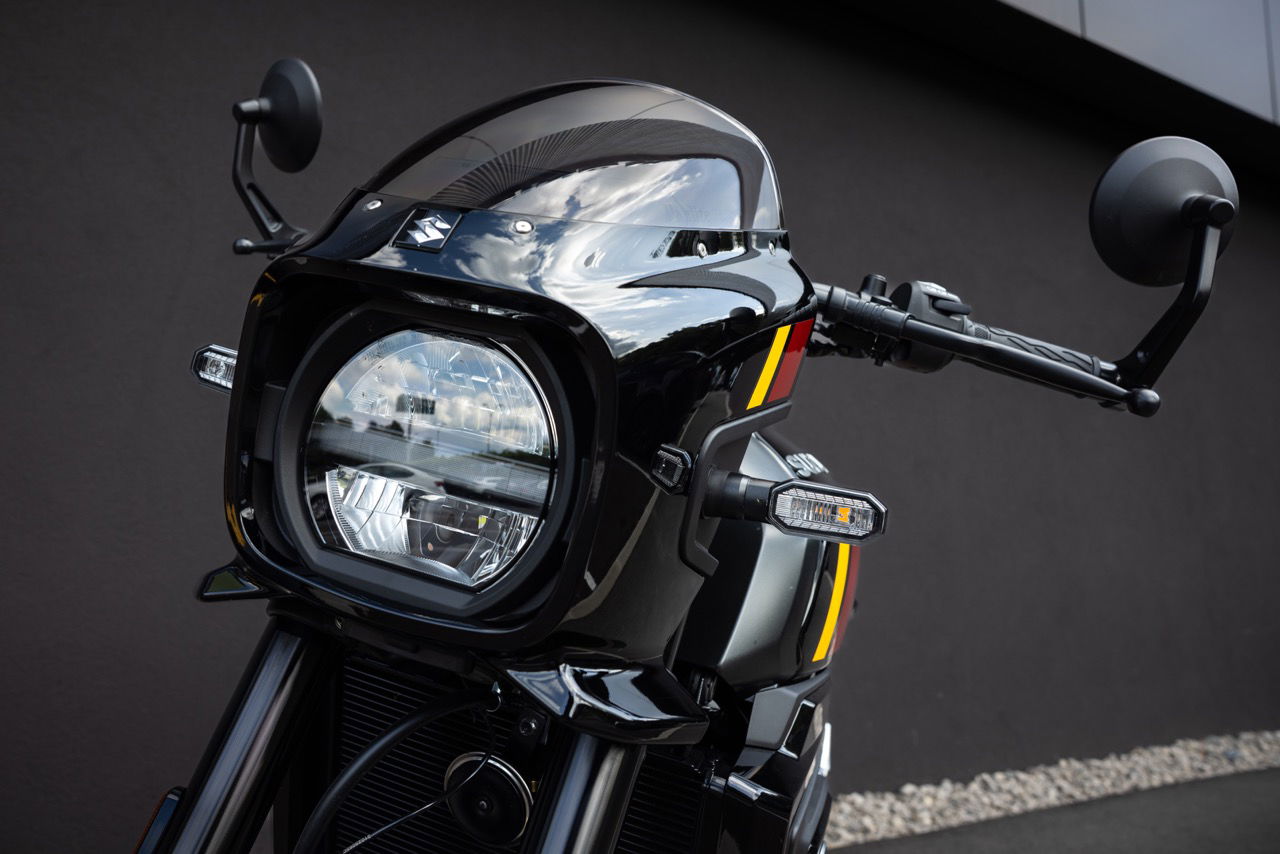
If you’ve already thrown a leg over the GSX-8S, this part of the review won’t come as a shock. Underneath the new threads, the 8T and 8TT are mechanically identical. Ride them back-to-back and you might just detect a shift in the weight bias or a touch of aero stability, but we’re talking about negligible differences here. It’s the same handling, same performance, and same day-to-day usability you’ll find in the base model.
But, and this is key, that’s not a bad thing. Because the GSX-8S is already a fantastic motorcycle.
If you haven’t ridden the GSX-8S, let’s dive into what makes this platform so good in the first place.
The Engine
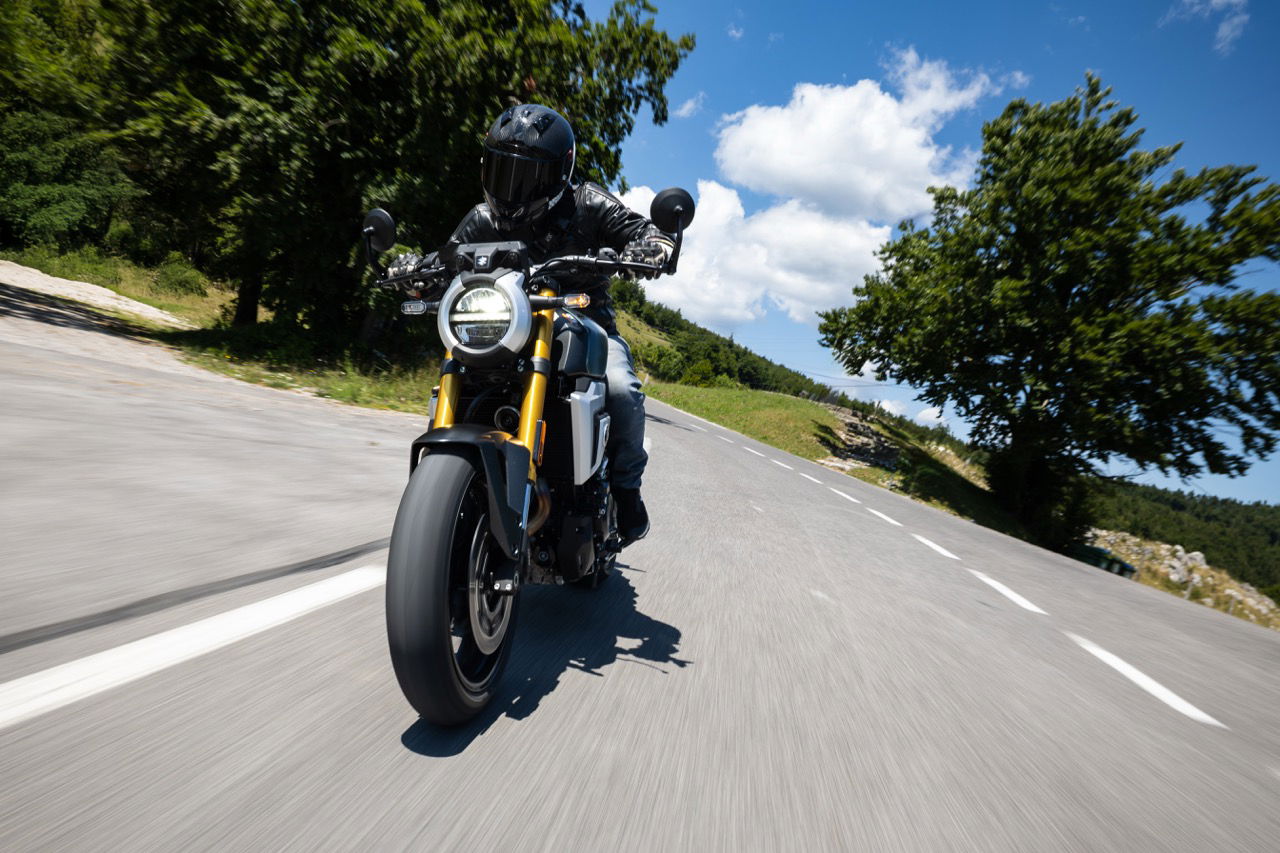
Suzuki’s 798cc parallel twin is an absolute peach. Compared to its closest rival (Yamaha’s CP2), it feels more grunty and serious. Mid-range shove is very strong, to the point where you can leave it in second or third all day without ever feeling short-changed.
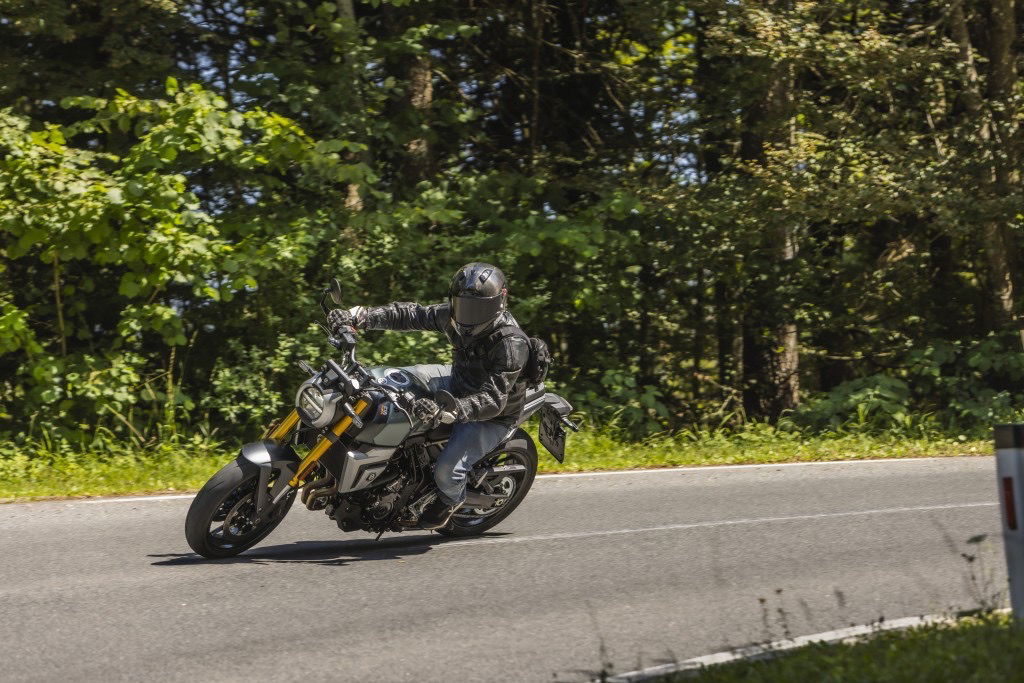
Power delivery is smooth and linear, and while it doesn’t rev as sky-high as an inline-four, it pulls strongly, all the way to 9,500rpm before calling it quits. There’s a bit of vibration through the pegs at high RPMs, but nothing that spoils the ride too much.
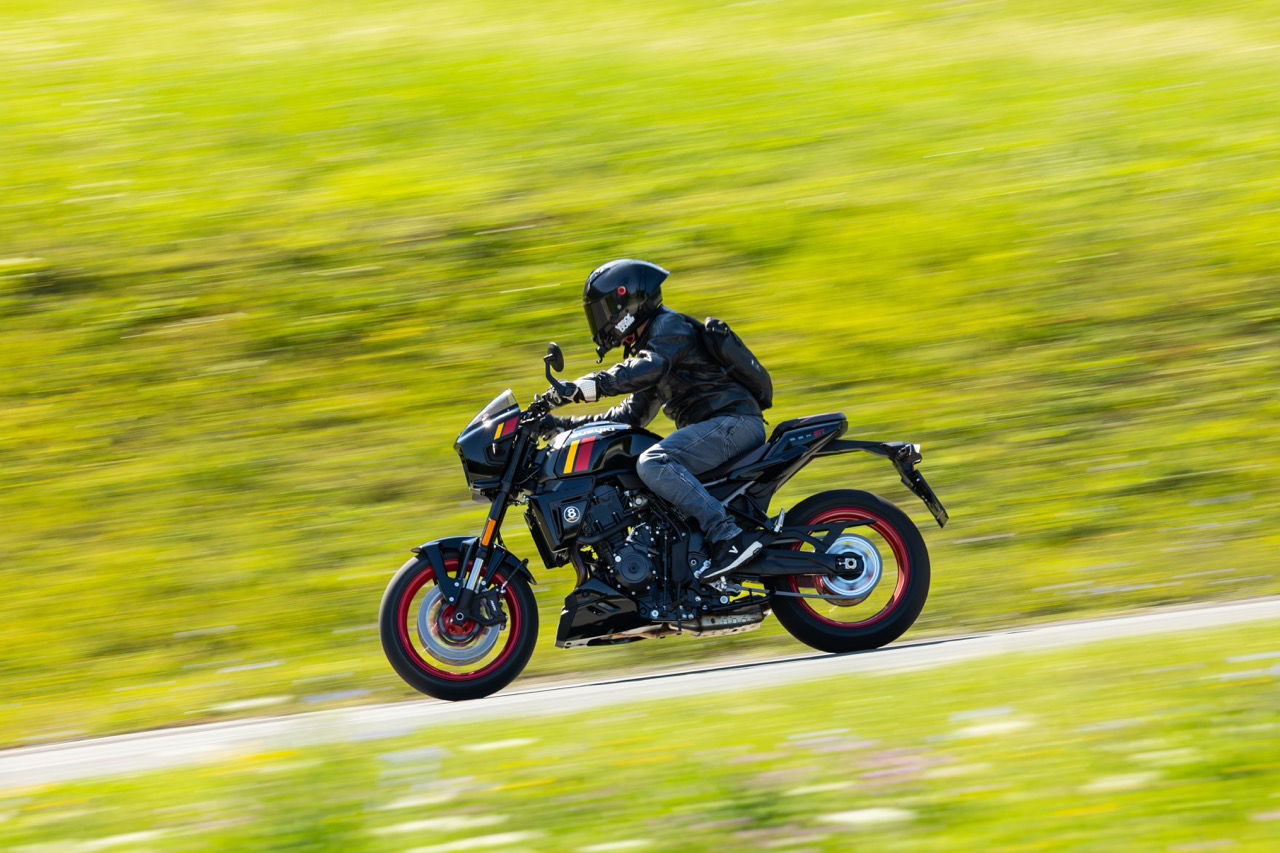
Throttle response and fuelling are excellent. The engine power modes make a meaningful difference (particularly useful in poor weather) and the slipper clutch adds a welcome layer of safety and fun. It’ll let you get cheeky with downshifts if that’s your thing, kicking the back wheel out on command, but it feels natural and predictable.
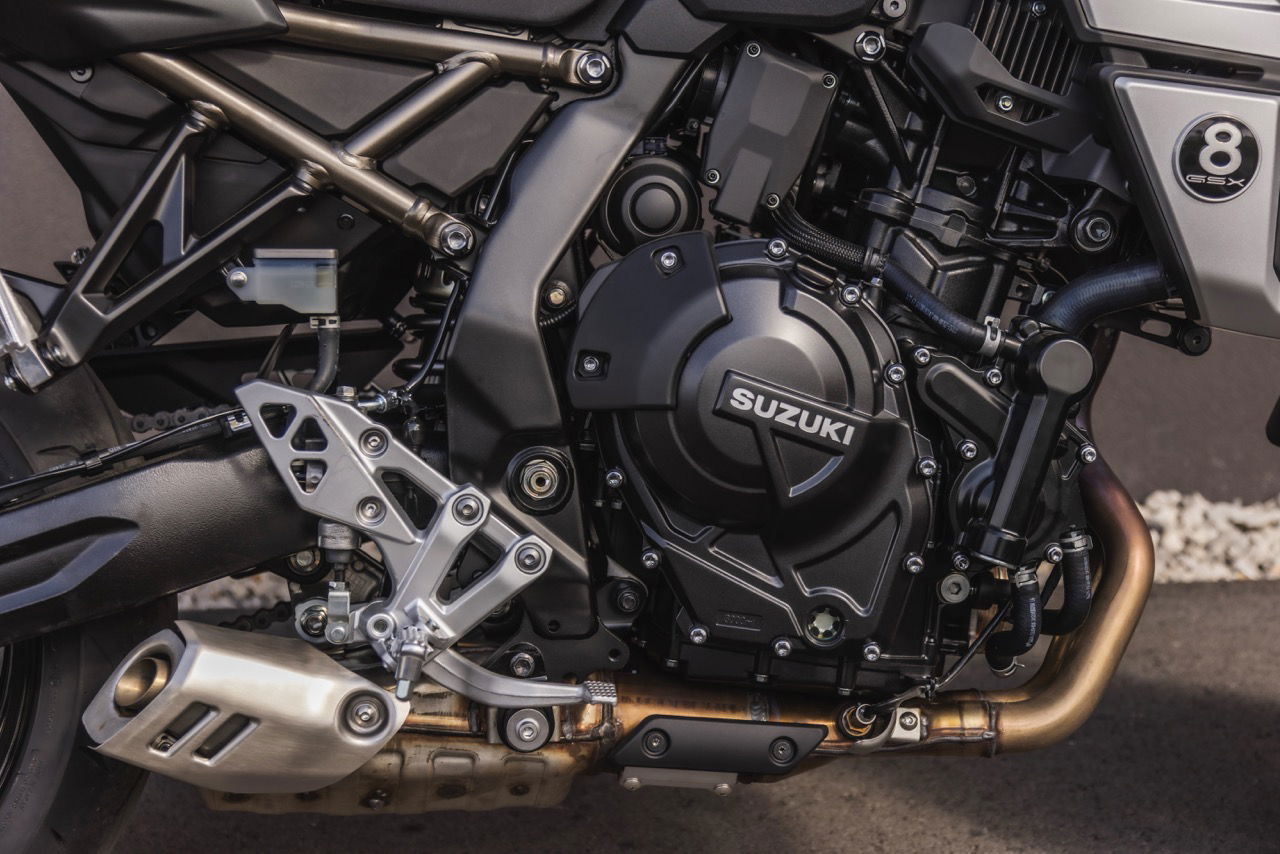
The gearbox is also a highlight. Slick, precise, and positive, with no false neutrals during our test. The quickshifter works well most of the time, feeling only slightly clunky at low speeds or when you’re being ham-fisted. One bonus with the quickshifter on the bikes is the ability to shift up and down on a trailing throttle. It’s not every day you do it, but its handy from time to time.
The Chassis

Suspension is by KYB, and while it’s not fully adjustable, it gets the job done. Is it as plush or does it offer that premium feel you get from the adjustable Showa kit found on the V-Strom? No. Did I notice it out on the road today? Yes, but only when the going got really rough.
The 8T and 8TT are happiest on fast, smooth sweepers. The chassis is stable and composed, inspiring confidence without ever feeling twitchy or unsettled. You can push on without fear, and it rewards a committed rider.
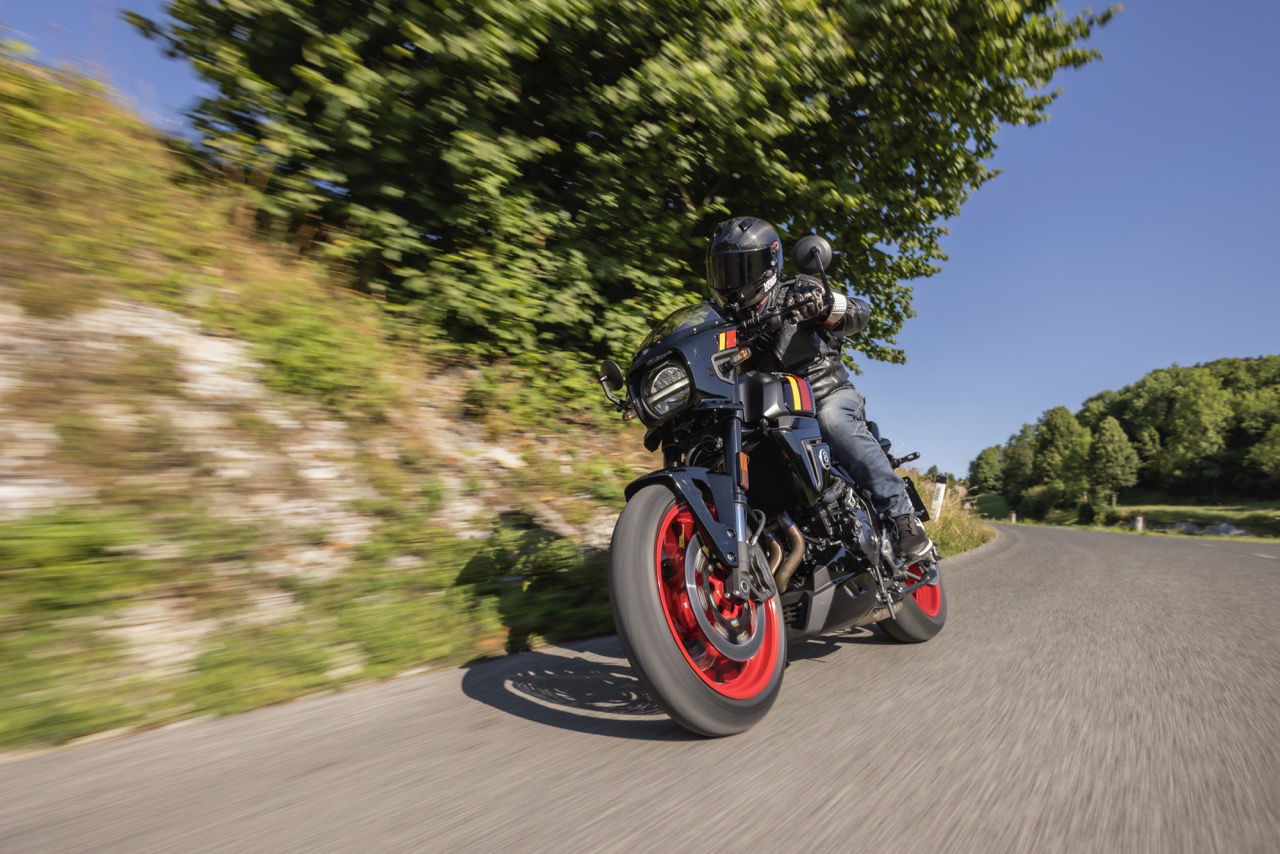
As mentioned, bumpy B-roads can expose the limitations of the suspension, but that’s to be expected given the hardware being used. Unsurprisingly, Suzuki made zero mention of the suspension during the presentation, and it took me to raise my hand and question the engineers to get any information. If this were more premium kit, Suzuki would have made a much bigger deal about it.
Brakes
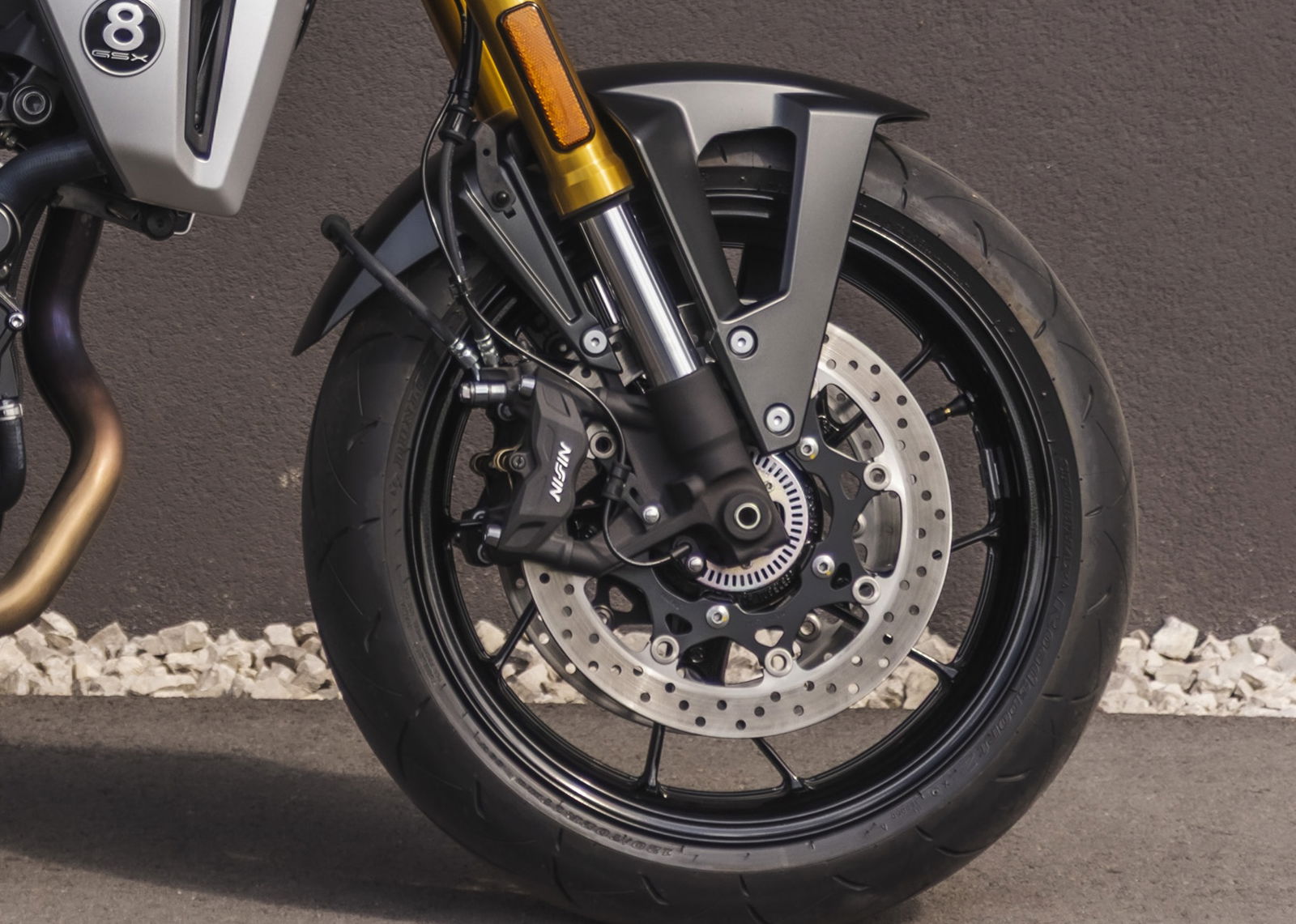
Nissin four-piston calipers do the stopping duties, and they’re more than up to the task. Braking power is solid, progressive and inspires trust, especially with just over 200kg of bike to haul up.
The ABS isn’t IMU-controlled, and while that might raise eyebrows in the spec-sheet-reading crowd, we didn’t find it to be a problem on the road. The system only intervened when absolutely necessary and remained unobtrusive throughout the day.
Comfort & Ergonomics
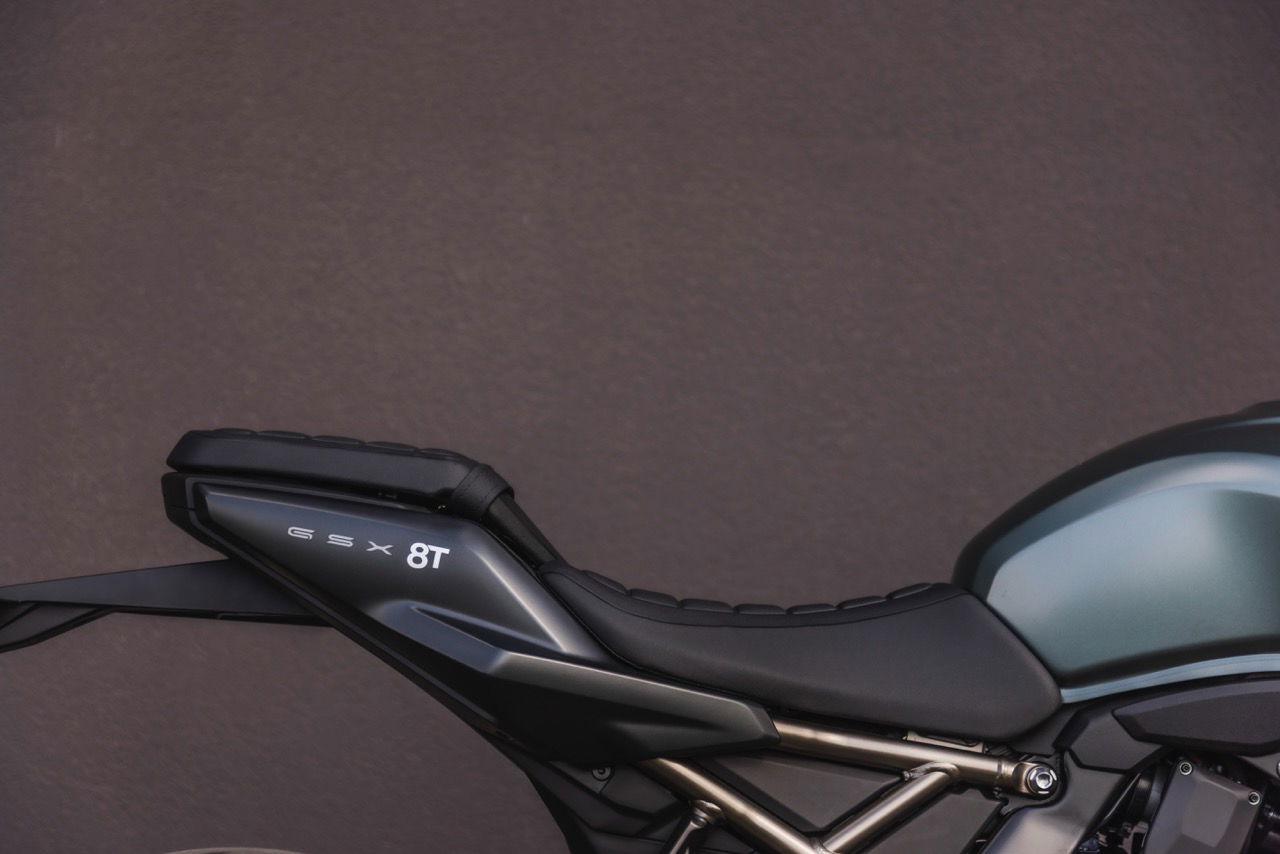
Here’s where the 8T and 8TT gain a slight edge over the 8S.
That ‘tuck and roll’ seat on the 8T looks great and adds a bit more plushness than the standard perch. Even the 8TT’s seat, while not quite as luxurious, feels like an improvement over the 8S.
Ergonomically, the bikes are all but identical. Same upright riding position, same natural bar and peg placement. What the 8TT does gain, however, is that neat little headlight cowl with an aero-vent mounted in the upper edge. It’s a surprisingly effective bit of design, smoothing out the airflow and noticeably reducing helmet buffeting at higher speeds.
The Verdict – Style Over Substance?
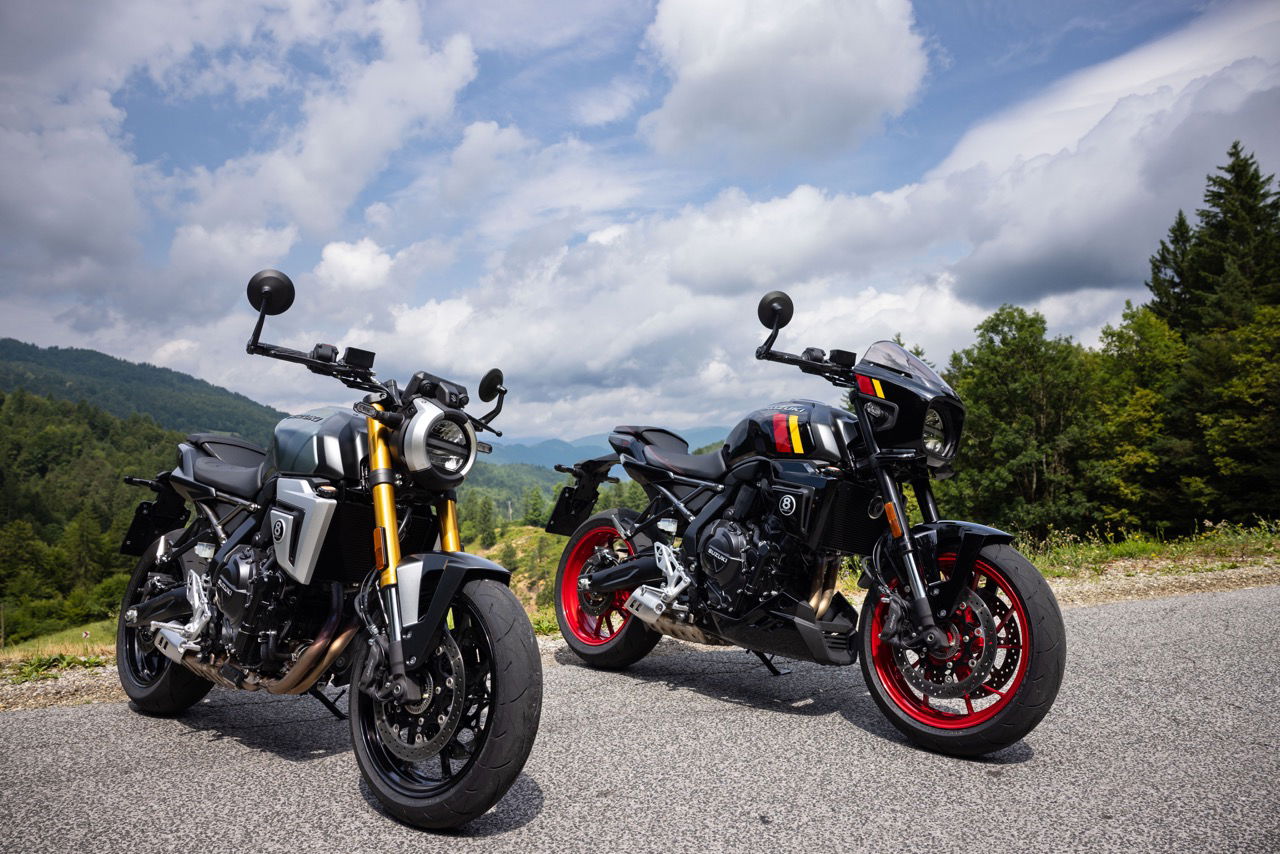
Here’s the crux of it: from a handling and performance standpoint, there’s very little to separate the GSX-8T, 8TT, and the 8S. So if you’re purely about the ride, the base model makes a strong case for itself at £7,499.
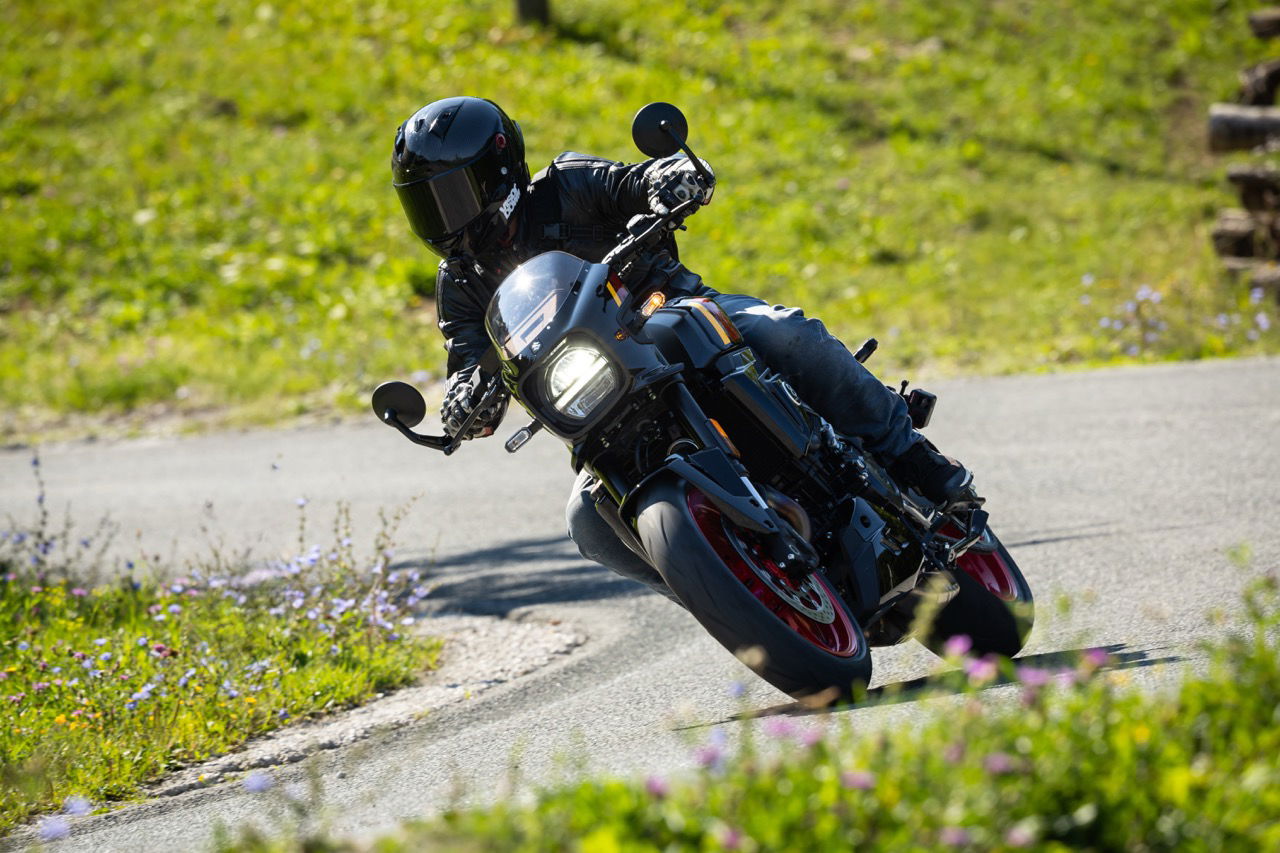
But if, like many riders, you care about the way your bike looks as much as the way it rides, then there’s a lot to like here. Personally, I’ve never warmed to the alien-esque face of the GSX-8S. The new headlight and revised styling of the 8T and 8TT strike a chord with me. They’re both handsome bikes, especially the TT, which plucks the nostalgia strings just that little bit harder.
Unsurprisingly, if I had to choose one, it would be the 8TT. I’m a sucker for retro-styled machines, and the nod to the original T500 hits the mark. It reminds me of the kind of bikes I saw as a kid, and there’s something honest and charming about that.
The Kicker
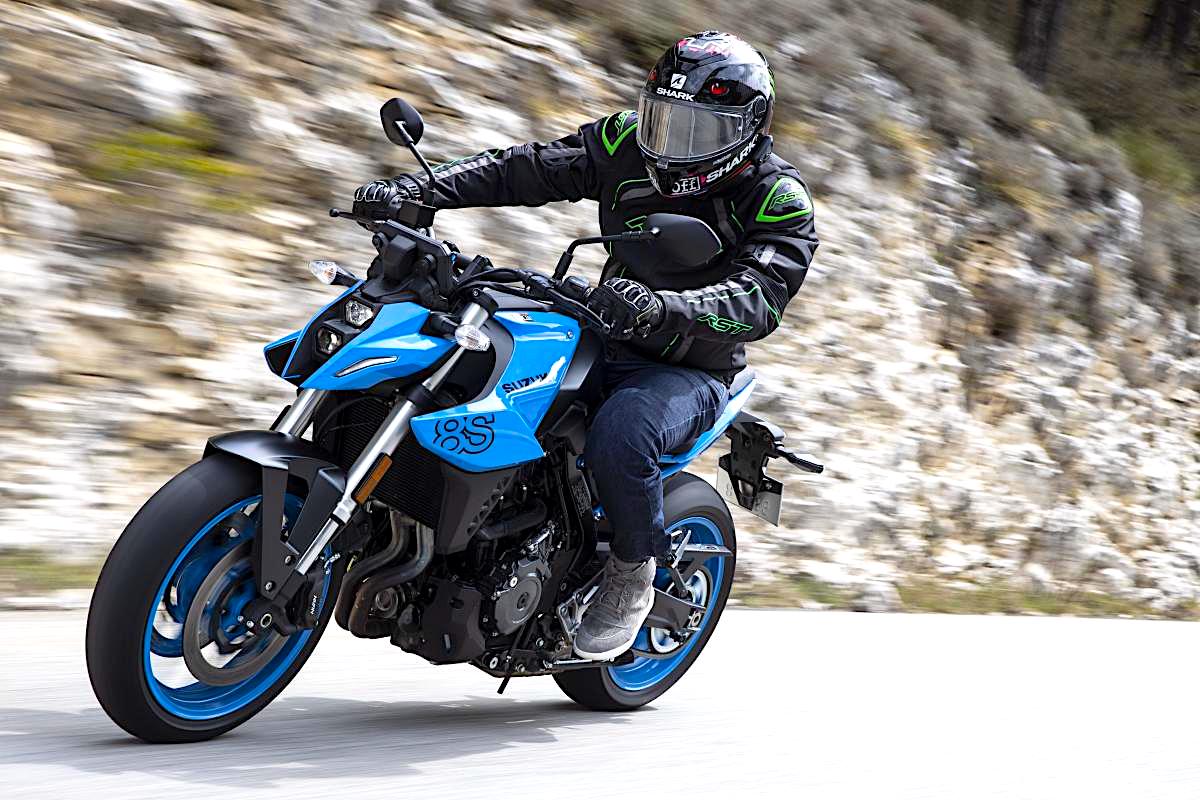
Now, here’s where things get complicated. Has Suzuki done enough to differentiate these bikes from the base model? This is the question that has been circling my head all day and since I got off the two new bikes.
Yes, the styling is improved. Yes, the seat and small aero tweaks make for a slightly nicer ride. But mechanically, they’re identical. There’s no change to the suspension, riding position, or exhaust. For £2,500 more than the 8S, I’d have liked to see something, anything, to differentiate them on a dynamic level. Adjustable suspension, perhaps, or something as simple as revised geometry, or a side-mounted muffler to give the bikes that classic 70s and 80s look.
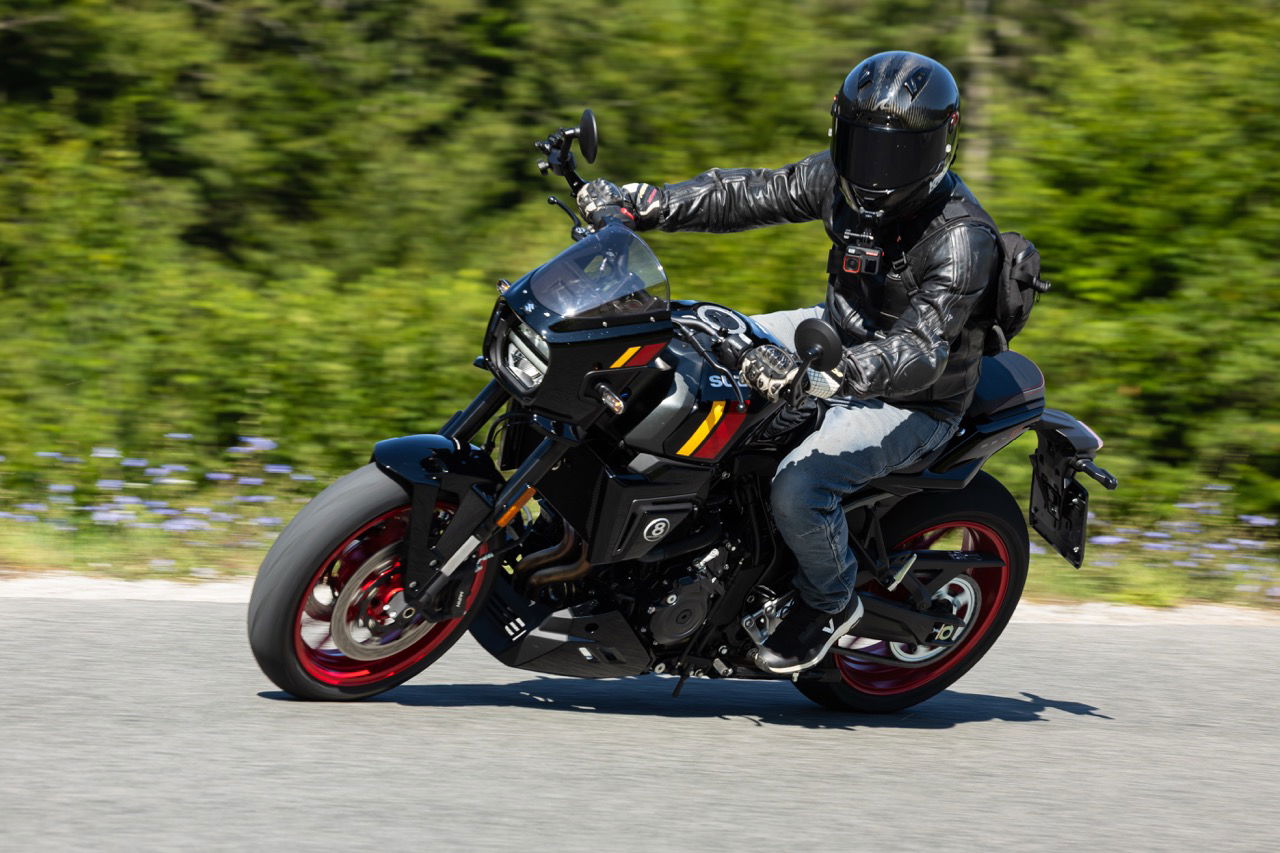
That’s where the value proposition gets a bit murky. For some riders, the styling alone will be enough, and that’s great, I’m sure you’ll enjoy your new bike. For others, it might feel like a missed opportunity. The GSX-8T and GSX-8TT are smart, capable, well-built bikes that build on an already excellent platform. They look great, ride brilliantly, and serve as a welcome return to form for Suzuki’s design department.
But if you're considering one, be honest with yourself. Are you buying it for the way it rides? Or the way it looks? Because on the road, all three GSX-8s are effectively the same. But when it comes to character and charm, the 8T and 8TT do bring a little more to the table. Whether that’s worth the extra cash? Well, that’s a decision you’ll have to make.
You can find out more about the two new models over on the official website.
GSX-8T and GSX-8TT specs and comparison to Yamaha MT-07
Spec | Suzuki GSX-8T | Suzuki GSX-8S | Yamaha MT-07 |
Engine | 798cc parallel twin | 798cc parallel twin | 689cc parallel twin |
Power | 80 bhp @ 8,500rpm | 80 bhp @ 8,500rpm | 72.4 bhp @ 8,750rpm |
Torque | 57 lb·ft @ 6,800rpm | 57 lb·ft @ 6,800rpm | 49.4 lb·ft @ 6,500rpm |
Gearbox | 6-speed | 6-speed, | 6-speed |
Clutch | Slipper clutch | Slipper clutch | Assist & slipper clutch |
Weight (kerb) | 201 kg / 203 kg TT | 202 kg | 184 kg |
Fuel Tank | 16.5 litres | 14 litres | 14 litres |
Claimed Range | ~244 miles | ~207 miles | ~220 miles |
Seat Height | 815mm 8T 810mm 8TT | 810 mm | 805 mm |
Brakes (Front) | 2 x 310mm discs, Nissin 4-pot | Same | 2 x 298mm discs, 2-pot |
Suspension (Front) | KYB 43mm USD forks (non-adj.) | Same | 41mm forks (adj) |
Suspension (Rear) | KYB monoshock (adj. preload) | Same | Link-type monoshock (adj. preload) |
Electronics | 3 power modes, TCS, QS | Same | TCS and power modes QS optional |
Lighting | LED with cowl + aero vent | Stacked LED | LED |
Dash | TFT | TFT | TFT |
Battery | Li-ion (lightweight) | lead-acid | lead-acid |
Price (UK) | £9,599 | £7,499 | £7,704 |
